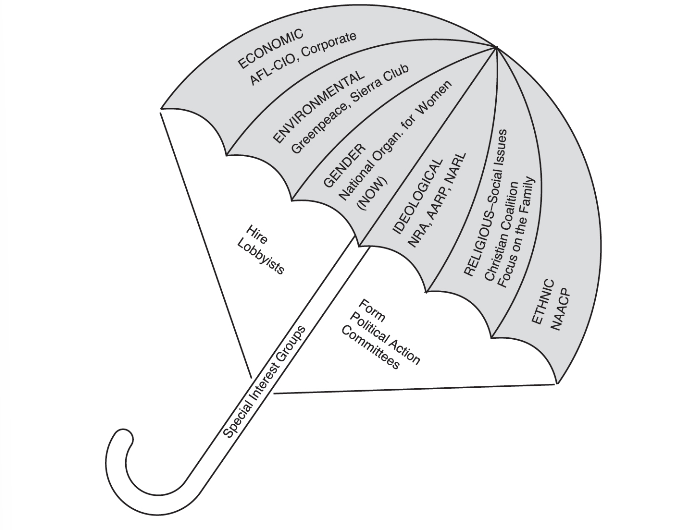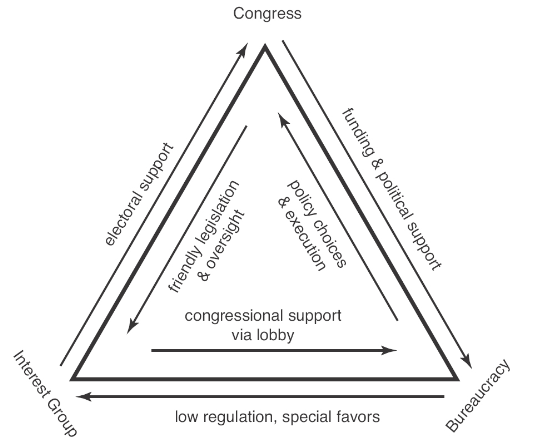
Chapter 5: Political Participations
Voting
Participation in the political process is the key gauge of how successful political parties are in involving the average citizen
People participate in a variety of ways, but voting is not the foremost way - the American electorate has not turned out in droves
The Right to Vote
When the Constitution was ratified, the ability to vote was given to white male property owners only, so there was a long struggle to obtain suffrage for individuals who were held back by such considerations as property ownership, race, religious background, literacy, ability to pay poll taxes, and gender
The Fifteenth Amendment gave black men the right to vote and the Nineteenth Amendment gave women the right to vote
Although these amendments advanced voting rights, voting suppression is still a problem
Models of Voting Behavior
Retrospective Voting: refers to the decisions people make on voting based on how political parties perform, how elected officials perform, and the extent to which an elected administration achieves its goals
Rational Choice Voting: refers to voting based on decisions made after considering alternative positions
Prospective Voting: refers to voters deciding that what will happen in the future is the most important factor
Party-line Voting: refers to voting for the same party for every office that candidates are running for
Linkage Institutions
The linkage institutions of special-interest groups, political parties, and the social movements they generate create the means for political participation and impact how people identify with and relate to the government and officials who make public policy
Political Parties
Two-Party System
The party system can be viewed as competitive
Different philosophies and approaches to the development and implementation of public policy have determined which party and which leaders control the government
You can look at political parties as either an organization, as its relationship with the electorate, and its role in government
All political parties have the following common functions:
Nominating candidates who can develop public policy
Running successful campaigns
Developing a positive image
Raising money
Articulating issues during a campaign so that the electorate will identify with a particular party or candidate
Coordinating the implementation of the policies they supported
Maintaining a watchdog function if they do not succeed in electing their candidates
Political parties exist on both the national and local levels and are hierarchal
Interest Groups
The definition of an interest group is a linkage group that is a public or private organization, affiliation, or committee that has as its goal the dissemination of its membership’s viewpoint
The interest groups’ goals are carried out by lobbyists and political action committees
Group theory:

Special interest groups place their views on the political agenda by:
Testifying at congressional hearings
Contacting government officials directly
Providing officials with research information
Sending letters to their own membership
Trying to influence the press to present their own point of view
Suggesting and supporting legislation
Hiring lobbyists
Giving senators and representatives feedback from their constituents
Making contributions through PACs to campaign committees
Taking congressperson on trips or to dinner
Endorsing candidates
Working on political campaigns
Lobbyists:
The primary instruments for boosting a special-interest group’s goals with policymakers, people who literally wait in the lobbies of legislative bodies to meet senators and representatives as they go to and from the halls of Congress
Political Action Committees (PACs):
When an interest group gets involved directly in the political process, it forms separate political action committees or PACs, which raise money from the special-interest group’s constituents and make contributions to political campaigns on behalf of the special interest
Super PACs: PACs that are regulated by the Federal Election Commission and are supposed to act independently from any candidate or campaign as they raise money for the purpose of supporting a position on specific issues through political advertisements
527 Super PACs: Also independent expenditure committees, these PACs can create independent expenditure accounts that can accept donations without limits from individuals, corporations, labor unions, and other political action committees
The Iron Triangle:

Elections as Linkage
Election outcomes have been influenced by laws, campaigning, voter turnout, electoral rules, and the polarization of the electorate
The Invisible Primary:
The “invisible primary,” the period between a candidate’s announcement that he or she is running for president and the day the first primary votes are cast, will heavily influence the outcome of the primary season
Primaries:
Primaries are used in different ways:
Closed primaries: only registered party voters can vote
Open primaries: registered voters from either party can cross over and vote in the other party’s primary
Proportional primary representation: where delegates are apportioned based on the percentage of the vote the candidate received in the primary election
Winner-takes-all primary: where, as in the general election, the candidate receiving a plurality receives all the delegates
Non-preferential primary: where voters choose delegates who are not bound to vote for the winner of the primary
A primary in which all the voters, including cross-over voters from other political parties, can express a preference but do not actually select delegates to the convention
A dual primary: where presidential candidates are selected and a separate slate of delegates is also voted on. New Hampshire uses this type of primary
The Media as Linkage
The media as a linkage institution provides opportunities for citizens to participate in the political process based on the information they receive
The media as a linkage institution provides opportunities for citizens to participate in the political process based on the information they receive
This has led to the growth of the Internet as the dominant place to get news
The media coverage of campaigns has been criticized by candidates on account of fairness
Many politicians attempt to control and manipulate the media, creating their own media events and photo opportunities
Media bias is also a concern
Chapter 5: Political Participations
Voting
Participation in the political process is the key gauge of how successful political parties are in involving the average citizen
People participate in a variety of ways, but voting is not the foremost way - the American electorate has not turned out in droves
The Right to Vote
When the Constitution was ratified, the ability to vote was given to white male property owners only, so there was a long struggle to obtain suffrage for individuals who were held back by such considerations as property ownership, race, religious background, literacy, ability to pay poll taxes, and gender
The Fifteenth Amendment gave black men the right to vote and the Nineteenth Amendment gave women the right to vote
Although these amendments advanced voting rights, voting suppression is still a problem
Models of Voting Behavior
Retrospective Voting: refers to the decisions people make on voting based on how political parties perform, how elected officials perform, and the extent to which an elected administration achieves its goals
Rational Choice Voting: refers to voting based on decisions made after considering alternative positions
Prospective Voting: refers to voters deciding that what will happen in the future is the most important factor
Party-line Voting: refers to voting for the same party for every office that candidates are running for
Linkage Institutions
The linkage institutions of special-interest groups, political parties, and the social movements they generate create the means for political participation and impact how people identify with and relate to the government and officials who make public policy
Political Parties
Two-Party System
The party system can be viewed as competitive
Different philosophies and approaches to the development and implementation of public policy have determined which party and which leaders control the government
You can look at political parties as either an organization, as its relationship with the electorate, and its role in government
All political parties have the following common functions:
Nominating candidates who can develop public policy
Running successful campaigns
Developing a positive image
Raising money
Articulating issues during a campaign so that the electorate will identify with a particular party or candidate
Coordinating the implementation of the policies they supported
Maintaining a watchdog function if they do not succeed in electing their candidates
Political parties exist on both the national and local levels and are hierarchal
Interest Groups
The definition of an interest group is a linkage group that is a public or private organization, affiliation, or committee that has as its goal the dissemination of its membership’s viewpoint
The interest groups’ goals are carried out by lobbyists and political action committees
Group theory:

Special interest groups place their views on the political agenda by:
Testifying at congressional hearings
Contacting government officials directly
Providing officials with research information
Sending letters to their own membership
Trying to influence the press to present their own point of view
Suggesting and supporting legislation
Hiring lobbyists
Giving senators and representatives feedback from their constituents
Making contributions through PACs to campaign committees
Taking congressperson on trips or to dinner
Endorsing candidates
Working on political campaigns
Lobbyists:
The primary instruments for boosting a special-interest group’s goals with policymakers, people who literally wait in the lobbies of legislative bodies to meet senators and representatives as they go to and from the halls of Congress
Political Action Committees (PACs):
When an interest group gets involved directly in the political process, it forms separate political action committees or PACs, which raise money from the special-interest group’s constituents and make contributions to political campaigns on behalf of the special interest
Super PACs: PACs that are regulated by the Federal Election Commission and are supposed to act independently from any candidate or campaign as they raise money for the purpose of supporting a position on specific issues through political advertisements
527 Super PACs: Also independent expenditure committees, these PACs can create independent expenditure accounts that can accept donations without limits from individuals, corporations, labor unions, and other political action committees
The Iron Triangle:

Elections as Linkage
Election outcomes have been influenced by laws, campaigning, voter turnout, electoral rules, and the polarization of the electorate
The Invisible Primary:
The “invisible primary,” the period between a candidate’s announcement that he or she is running for president and the day the first primary votes are cast, will heavily influence the outcome of the primary season
Primaries:
Primaries are used in different ways:
Closed primaries: only registered party voters can vote
Open primaries: registered voters from either party can cross over and vote in the other party’s primary
Proportional primary representation: where delegates are apportioned based on the percentage of the vote the candidate received in the primary election
Winner-takes-all primary: where, as in the general election, the candidate receiving a plurality receives all the delegates
Non-preferential primary: where voters choose delegates who are not bound to vote for the winner of the primary
A primary in which all the voters, including cross-over voters from other political parties, can express a preference but do not actually select delegates to the convention
A dual primary: where presidential candidates are selected and a separate slate of delegates is also voted on. New Hampshire uses this type of primary
The Media as Linkage
The media as a linkage institution provides opportunities for citizens to participate in the political process based on the information they receive
The media as a linkage institution provides opportunities for citizens to participate in the political process based on the information they receive
This has led to the growth of the Internet as the dominant place to get news
The media coverage of campaigns has been criticized by candidates on account of fairness
Many politicians attempt to control and manipulate the media, creating their own media events and photo opportunities
Media bias is also a concern
 Knowt
Knowt
